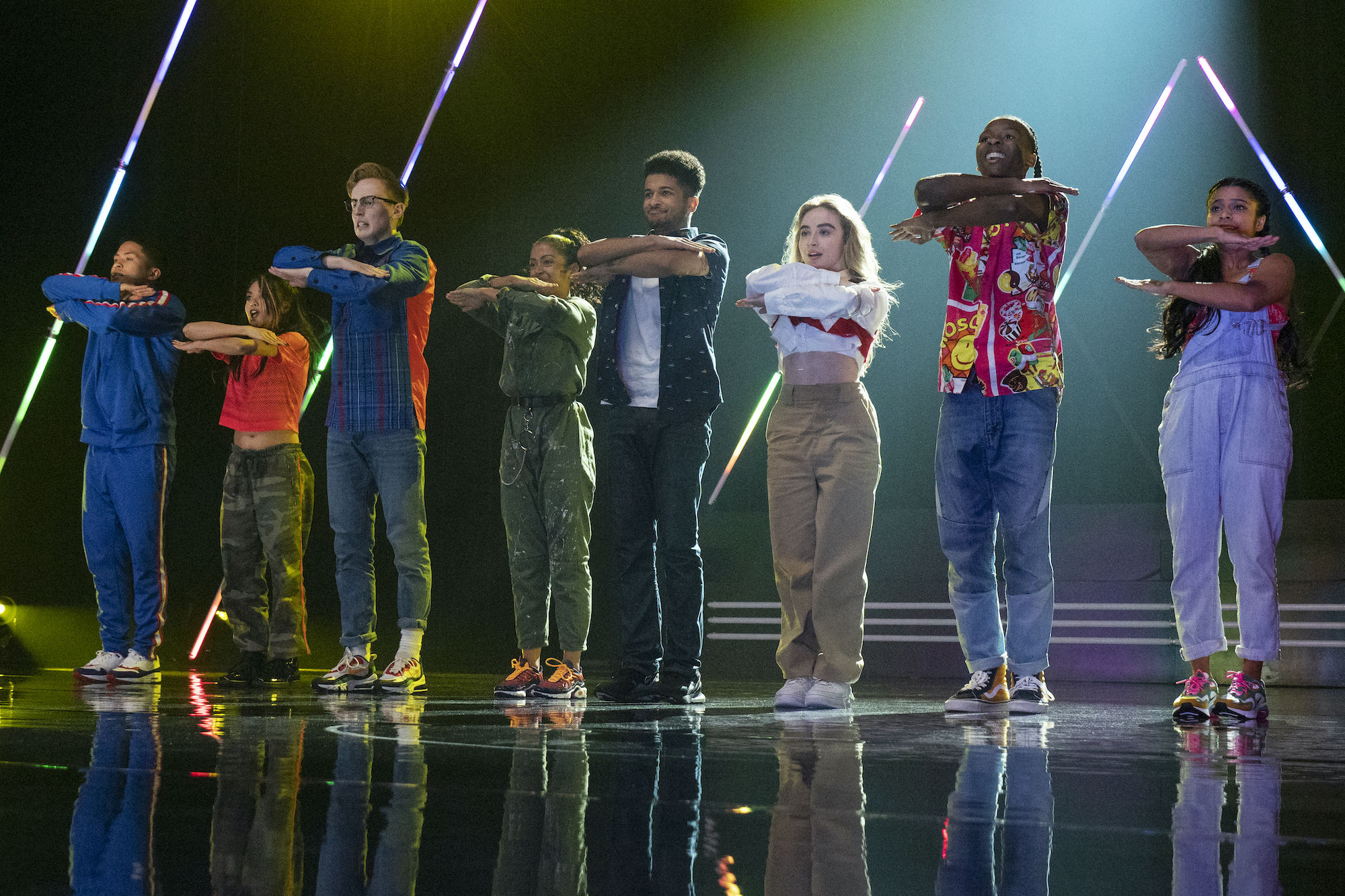What to Watch Verdict
Solid dance sequences bolster teenage story that too often feels formulaic.
Pros
- +
🎶 Sabrina Carpenter is convincing and charming as Quinn, a bookworm-turned-wannabe breakdancer.
- +
🎶 Keiynan Lonsdale steals every scene as Quinn's domineering nemesis.
Cons
- -
🎶 Too much of the story away from the dancefloor feels very familiar.
Dance movies are one of the few genres that seem to benefit from using or adhering to formulas for its storytelling; like any other, the success or failure depends on how effectively the filmmakers use them, even moreso than in action, horror or even romantic comedy, scenes are designed as hangers for choreography, movement, and for routines. The best of them use those routines as character development, and sometimes storytelling itself. Netflix’s Work It, a featherweight teen comedy about an ambitious high school senior and the dance squad that comes between her and her academic goals, manages to touch on this idea in promising ways, but yields too frequently to the conventions of character and story, leaving the dancing - the real reason to watch the film - without great purpose, meaning or impact.
Sabrina Carpenter, a cherubic real-life pop star genetically engineered from equal portions of DNA from Imogen Poots and Chloe Moretz, plays Quinn Ackerman, a young overachiever who’s spent her entire high school career orchestrating perfect transcripts for college. (Her dream school is her late father’s alma mater Duke University, a detail which this UNC-Chapel Hill graduate will try not to take into consideration in this review. But boo.) When Veronica (Michelle Buteau), Duke’s kooky admissions officer, suggests she needs more out-of-the-box interests to gain an advantage over her immaculately-credentialed competitors, Quinn lies and claims to be part of her school’s award-winning dance team. But unfortunately, not only is Quinn disastrously inexperienced (not to mention awkward) on her feet, but a technical gaffe as head of the a/v club has put her on the outs with the squad’s preening leader Juilliard Pembroke (Keiynan Lonsdale).
Enlisting her best friend Jasmine (Liza Koshy) to help her gain the basic rhythm (much less hard-earned skill) to hold her own against Juilliard, Quinn assembles a squad comprised of oddballs and wannabes and begins preparing for the competition. Quinn even entices hunky former dancer Jake Taylor (Jordan Fisher), a star sidelined after an injury, to train and choreograph their team, which she dubs “the TBDs” until a better name can be chosen. But when the TBDs’ progress begins to come at the expense of Quinn’s other grades, she’s forced to make a choice between a new hobby she’s growing to love and the possibility of jeopardizing the academic future she’s worked her whole life to achieve.
20 years removed from stuff like Save The Last Dance, fans of the genre no longer have to contend with the fictional divide between “formal” dance - ballet and interpretational, for example - and marginalized subcultures like hip-hop and ballroom. The Step Up movies feel like a historical chronicle of that evolution, or perhaps education. The dancing in Work It seamlessly includes breakdancing, voguing, tutting, glow-sticking and more, an indication not only of the inclusiveness of contemporary choreography but the erosion of traditional ideas of masculinity and femininity, not to mention the universal appeal of watching someone get absolutely served on a dance floor. Choreographer Aakomon Jones meshes these different styles effectively, but at the slight cost of the dance scenes being more distinctive, from one another much less from those in other movies.
This becomes a bigger issue as the movie progresses primarily because Alison Peck’s script, ably directed by Laura Terruso, seems to want to foreground the individual dancers and their unique skills even as they form a more cohesive group. Quinn and Jas find a lackluster soccer player (Neil Robles) with exceptional footwork, and a beanpole (Tyler Hutchings) who can execute a flawless flip; these skills are never really spotlighted in the way they deserve. Meanwhile, Quinn’s story (and her burgeoning abilities) become the increasing focus, which feels like a tactical storytelling error - an understandable choice if this were a more traditional drama or even romantic comedy, but a distraction in a movie whose raison d’etre is to watch these people show their stuff.
Mind you, Quinn is a recognizable, deeply relatable kind of character, and Carpenter navigates a successful balance between her character’s academia-oriented approach to learning dance (breaking it all down intellectually) and losing herself in the rhythm of the music. (The fact that there are a couple of identifiable songs on the soundtrack, including two by Dua Lipa and Gloria Estefan’s “Get On Your Feet,” sweetly called back to bring Quinn’s relationship with her mom full circle, certainly helps.) But it’s hard to know if “learning how to feel” is a notion that happens to be a really successful engine for teen-movie drama, or if it’s something generations of viewers really need to learn over and over again.
Either way, Michelle Trachtenberg went through similar motions in the 2005 figure-skating movie Ice Princess, Charlie Korsmo did in Can’t Hardly Wait, Gabriel Jarrett in Real Genius, and so on. The ensemble nature of Terruso’s film feels vaguely cribbed from Pitch Perfect, while the Step Up movies (especially 2-4) more ably showcase the unique abilities of secondary characters without diffusing the emphasis on the main character’s journey towards dance excellence (or self-discovery, whichever comes first). That said, one thing the movie communicates well is the simple truth that no matter how well you learn choreography, you’re just not going to look good if you can’t actually dance. That the TBDs unite to form a team comes as less of a surprise than the discovery that several of the group’s members were only pretending that they lacked rhythm; it’s by far the best acting in the film.
Ultimately, I’m not sure if Work It necessarily expands the legacy of dance films, but this is a genre that seems permanently affixed to young people, and this entry serves them ably. (Any movie in 2020 that features a dance-off where a young man with pink hair defeats his opponent by voguing absolutely earns its place in the culture.) Really, its failings feel more a part of the formulas it embraces - their familiarity, and rigidity are slightly too oppressive for even this attractive and talented cast. All of which is why for a movie about learning how to feel the music, Work It mostly seems like it’s just counting steps.
Todd Gilchrist is a Los Angeles-based film critic and entertainment journalist with more than 20 years’ experience for dozens of print and online outlets, including Variety, The Hollywood Reporter, Entertainment Weekly and Fangoria. An obsessive soundtrack collector, sneaker aficionado and member of the Los Angeles Film Critics Association, Todd currently lives in Silverlake, California with his amazing wife Julie, two cats Beatrix and Biscuit, and several thousand books, vinyl records and Blu-rays.












